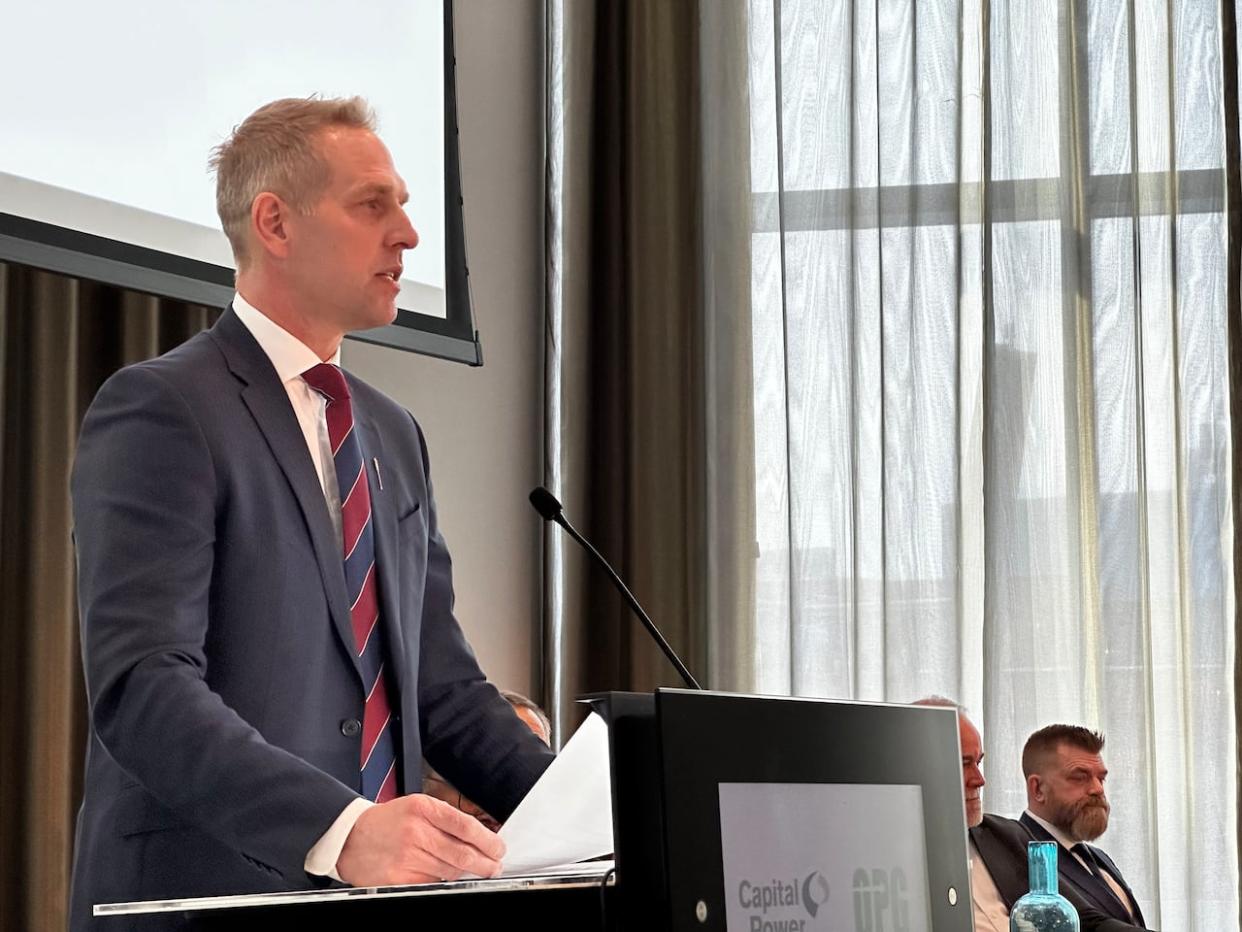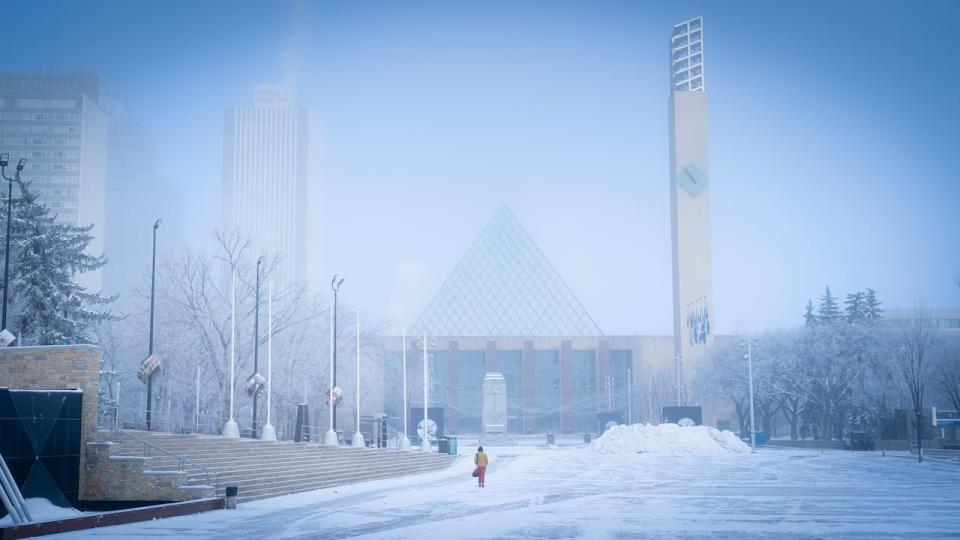Province did everything it could to prepare for winter surge in power demand, minister says

Alberta's affordability and utilities minister says the provincial government did everything it could to prepare for a surge in demand for power that utilities might not be able to meet.
"It was a learning experience," Minister Nathan Neudorf told reporters in Edmonton on Monday. "Hopefully, we won't have that experience again."
Record-breaking cold temperatures, little sun or wind during times of peak demand, and a handful of natural gas power plants offline led to Albertans consuming more electricity than generators could provide on Saturday night.
It prompted an emergency alert broadcast across province, pleading with citizens to shut off lights, unplug cars and avoid using appliances.
Energy Minister Brian Jean said increasing numbers of residents migrating to Alberta — some at the behest of provincial government advertising campaigns — also added demand on the power grid.
Albertans consuming almost all the available power generated in the province has led to 21 grid alerts since 2017, according to numbers from the Alberta Electric System Operator (AESO).
The AESO issued four of those alerts in the last four days, a spokesperson said on Monday.
Neudorf said the United Conservative Party government foresaw more times when demand could outstrip supply, which is why he ordered a review of the province's power system last summer.
Critics have questioned the UCP government's decision to reverse course in revamping Alberta's electricity market from energy-only to a capacity market.
The UCP opted to stay with an energy-only market, in which power generators are paid only for electricity they produce. The government said this option was more affordable.
Upon an AESO recommendation, the former NDP government had ordered a transition to a capacity market, which would pay power producers to have the ability to produce more electricity, more quickly. Proponents say this approach leads to more stability in supply and prices.
Neudorf told reporters on Monday that he doesn't know whether proceeding with a switch to a capacity market could have prevented the province from being a half-hour away from rolling brownouts.
University of Calgary associate professor of economics Blake Shaffer said it's hard to say whether having a capacity market would make a difference during such a severe chill.
He said the system reaching the brink without resorting to brownouts to conserve power suggests it's the right size.
"If it had been too easy during the absolute record-breaking time period, while that might be comfortable, that's not without its costs," Shaffer said on Monday.

An icy look at downtown Edmonton as an extreme cold snap continued Friday, January 12, 2024. (Manuel Carrillos Avalos/Radio-Canada)
Neudorf said the province's reliance on importing power from other jurisdictions — especially Saskatchewan — on Saturday night suggests Alberta should invest more in electrical interties to neighbouring provinces and states.
New plants totalling about 1800 MW of new power should come online in Alberta within the next six months, Neudorf said. On Monday evening, plants across the province were generating about 12,000 MW of electricity.
Opposition says lack of planning led to brownout risk
As Albertans switched off appliances Saturday night, many noted on social media that office buildings and public light installations remained illuminated.
The City of Edmonton has since turned off decorative lights on two bridges and in public plazas while the cold snap continues.
Neudorf said the government must better communicate with corporate and industrial power consumers to be certain they are also prepared to quickly power down non-essential draws on the electrical system.
However, households and small businesses heeded the call of the alert, reducing 100 megawatts of usage within a minute of the alert.
"It was actually emotional for myself that we saw that kind of response," Neudorf said.
The Opposition's critic climate and energy critic says the province should never have had to resort to drastic measures to conserve power.
NDP MLA Nagwan Al-Guneid said a "serious lack of planning" led to the crisis.
"This is a situation that could have been avoided by increasing supply and investing in technologies to create a reliable and affordable low-emissions grid," she said.
The government has yet to proclaim a piece of May 2022 legislation that would allow utilities to store energy for later sale. The government did not answer emailed questions Monday about why its implementation is delayed.
Al-Guneid said the government's seven-month pause on approving new renewable energy projects while evaluating their environmental impacts and clean-up requirements created uncertainty for investors.
Similarly, Premier Danielle Smith musing about the government building its own natural gas plants or creating a Crown corporation sends puzzling messages to potential energy investors, Al-Guneid said.
On Monday, Neudorf said the events of the past week haven't grown the government's appetite to get into the power production business.
The power demand crunch also rekindled wars of words between Prairie politicians and the federal government over Ottawa's green energy plans.
Smith has threatened to use the province's Sovereignty Act to challenge the federal government's clean electricity regulations over the Liberal's deadline to achieve a net-zero power grid by 2035.
Neudorf said Monday it was natural gas plants keeping the lights on during the past few days.
"We wouldn't just be talking about the possibility of brownouts and blackouts, we would be experiencing them," he said of the federal Liberals' climate plans.
Electricity economist Shaffer said the situation reinforces that incoming clean energy regulations should be more flexible in provinces like Alberta that rely so heavily on natural gas.
A spokesperson in Environment Minister Steven Guilbeault's office said the federal government has always said the incoming regulations will foster reliability and affordability.
"The regulations would never put the province in a situation where they did not have a reliable baseload, and it is why we are making provisions so that fossil fuel burning plants can run without carbon capture technologies during peak usage or in situations of emergency," read an emailed statement.
"To say we want to 'shut down plants' is simply not the case."


